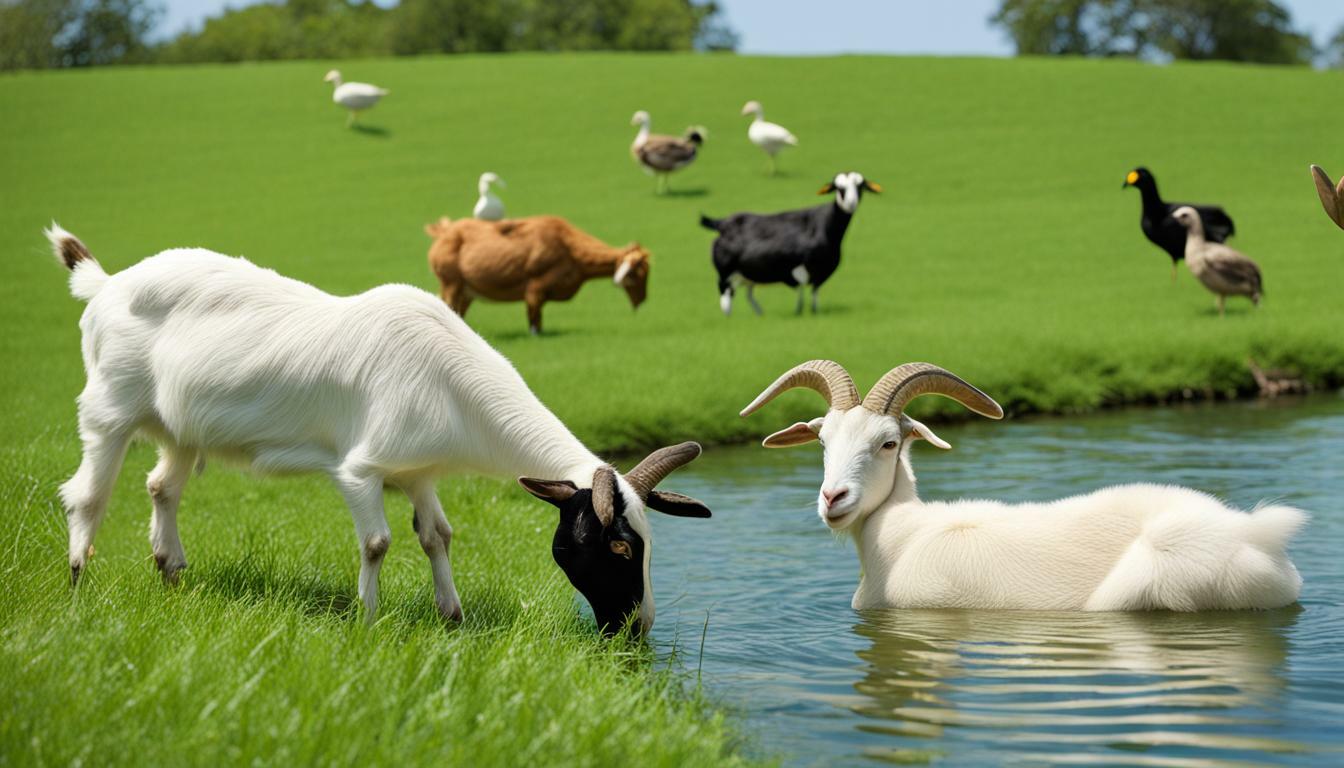Can Domestic Ducks Find Their Way Home? Unlocking the Mystery

Table of content:
- How Far Can a Domestic Duck Wander and Still Find Its Way Home?
- Do Domestic Ducks Have a Good Sense of Direction?
- Can I Let My Pet Duck Wander During the Day and Trust It to Come Home at Night?
- What is the Homing Ability of Domestic Duck Breeds?
- Should I Clip My Duck’s Wings So It Doesn’t Wander Too Far from Home?
- How Do Ducks Know How to Return to Their Home Pond or Coop?
- Will a Domestic Duck Remember Where Its Home Is if We Move to a New Location?
- Can Indian Runner Ducks Find Their Way Back Home If They Get Lost?
- Do Domestic Ducks Have Homing Instincts Like Pigeons?
- How Far Can I Let My Pet Duck Wander Before It Gets Lost?
- Final Thoughts
Domestic ducks can surprise their owners with their ability to find their way back home when they wander off or get lost. While not as renowned for their homing skills as pigeons, many domestic duck breeds possess a strong homing instinct that helps guide them home over surprising distances.
How Far Can a Domestic Duck Wander and Still Find Its Way Home?
Domestic ducks often enjoy exploring and wandering during the day when given the chance. With their wings clipped to prevent sustained flight, pet ducks will wander neighborhoods and fields while foraging. Most domestic ducks can successfully find their way back home if they wander up to a mile away. Extreme cases exist of ducks remarkably returning from distances of 5-10 miles back to their home pond or coop.
Duck breeds with especially good homing skills include Indian Runners, Welsh Harlequins, and Anconas. These intelligent and hardy ducks evolved as foraging land breeds. Their strong legs and inquisitive nature drive them to explore the area around their home thoroughly. As long as they can walk back, these breeds reliably find their way home from distances under a mile.
Do Domestic Ducks Have a Good Sense of Direction?
Most domestic ducks have a surprisingly keen sense of direction for navigating back to their home territory. Experts theorize ducks rely on three main senses to establish direction when wandering:
- Magnetoreception – Ducks can detect magnetic fields that guide their internal compass. The angle of sunlight may further help calibrate their compass.
- Smell – Ducks have strong olfactory senses that allow them to detect familiar scents from home, especially along waterways.
- Memory – Ducks remember and recognize visual landmarks near their home to repeatedly orient themselves.
Duck breeds like Indian Runners and Call Ducks that patrol a fixed home range intently use these homing skills daily. With their sharp directional abilities, these breeds feel secure venturing farther while foraging.
Can I Let My Pet Duck Wander During the Day and Trust It to Come Home at Night?
For many devoted duck owners, their pets feel more like feathery families than poultry. If you want to allow your pet duck more freedom during the day, you may be pleased to discover it faithfully returns home by dusk.
Certain precautions can encourage your duck to home reliably each night:
- Clip your duck’s primary flight feathers on one wing so it cannot fly off too far.
- Walk the duck around your intended home range so it learns the nearby sights and scents.
- Introduce your duck to ponds, creeks, or other waterways bordering their wandering range.
- Provide supplementary feed near the home to entice hungry ducks back.
With these precautions, breeds like Welsh Harlequins, Runners, and Calls should eagerly await release each morning and find their own way home each evening. Just be sure to shut them safely in their coop at night away from predators.
What is the Homing Ability of Domestic Duck Breeds?
While all domestic ducks retain their wild ancestors’ strong homing ability, some breeds truly excel at finding their way home:
Indian Runner – This athletic foraging duck breed is renowned for loyally returning home, even over several miles. Their strong legs let them cover large ranges while wandering.
Welsh Harlequin – Intelligent and curious, this unique duck breed reliably returns home after daily adventures probing the landscape around their home territory.
Call Duck – Small but adventurous, Call Ducks eagerly explore but recall visual cues to retrace their path back home. Their loud vocalizations gave the breed its name.
Rouen – This hardy continental breed has a strong homing instinct inherited from Mallard’s ancestors. Despite heavy bodies, Rouens wander widely and recall the route home.
Ancona – Energetic and foraging-driven, Anconas follow their instincts to cover a wide radius while grazing then unerringly home at dusk.
Knowing your duck breed’s innate homing ability lets you confidently give them more free-range time every day.
Should I Clip My Duck’s Wings So It Doesn’t Wander Too Far from Home?
For domestic ducks allowed to freely range, clipping the long primary flight feathers on one wing is a humane precaution to prevent them from straying too far. By clipping these few long feathers, your duck can still flap and glide limited distances but cannot take off into full flight.
Without clipping, some adventurous ducks could succumb to their migratory instincts and fly extensive distances. The clipped wing keeps them grounded while permitting short hops and controlled descents. The remaining flight feathers quickly regrow after clipping, so it is a temporary restraint.
If you want your duck to have the freedom to wander and forage nearby, have your veterinarian or experienced waterfowl owner humanely clip the innermost primaries on one wing every 4-6 weeks. Your duck will have ample freedom to explore on foot and satisfy their ranging instinct while staying safely nearby. Just be sure to provide adequate housing and supervision for times when they cannot range freely to avoid boredom.
How Do Ducks Know How to Return to Their Home Pond or Coop?
Ducks use their instinctive navigation abilities from the moment they hatch to imprint on their home range. Ducklings immediately begin visually memorizing landmarks around the nest for future reference. With daily reinforcement wandering these familiar areas, ducks create mental maps of their territory.
When given more freedom to wander, a duck will methodically explore while marking sensory reference points:
- Visual cues like gardens, structures, specific trees
- Smells along creek banks and ponds
- Magnetic orientation from the sunrise and sunset
By gathering these mental reference points, domestic ducks build robust knowledge of their home range to guide their regular returns. Just be sure to establish consistent routines and feeding times so your duck eagerly anticipates coming home each day.
Will a Domestic Duck Remember Where Its Home Is if We Move to a New Location?
Relocating to a new home with pet ducks in tow presents a unique challenge to their homing abilities. Ducks strongly imprint on the sights, smells, and magnetic feel of their home territory. When these familiar cues suddenly change, it can temporarily confuse them.
With patience and care, you can help transition your ducks to a new home:
- Set up their coop and establish new routines in the new location for 1-2 weeks before moving.
- Transport ducks in covered cages to reduce stress and disorientation en route.
- Keep ducks enclosed in their new outdoor space for 2-3 days after arriving.
- Reward them with treats for returning to the coop to motivate them.
- Walk them frequently around the property on a leash so they learn the new sights.
It may take a few weeks for your ducks to adapt their mental homing map to the new home. But with diligence establishing the same daily patterns, you can successfully imprint them on the new location.
Can Indian Runner Ducks Find Their Way Back Home If They Get Lost?
Thanks to exceptional homing ability, Indian Runner ducks can reliably find their way home if they become disoriented or lost. Selective breeding gave this lanky duck breed strong wandering instincts and intelligence to navigate back home.
Even if an Indian Runner escapes your property and gets lost, it can likely retrace its steps back using its memory and sense of direction. Certain tips will further improve their odds:
- Give them plenty of supervised wandering time to learn the local terrain.
- Ensure they are accustomed to returning home for daily feedings.
- Use unique vocalizations they associate with receiving treats.
- Check nearby waterways, fields, and hiding spots an escaped duck may shelter in.
With close bonds to owners and homing ability, a lost Indian Runner will likely make its way back home within a day or so if given the chance. Keep a close eye on these wandering ducks until they learn your property boundaries thoroughly.
Do Domestic Ducks Have Homing Instincts Like Pigeons?
The superb navigational instincts of homing pigeons are well-documented. Researchers have discovered domestic ducks possess a similar mental map and compass sense allowing them to return home over considerable distances.
Like pigeons, ducks appear to utilize these innate skills:
- Magnetoreception – Detecting magnetic fields and sunlight angles to maintain their bearings, even when traversing unfamiliar terrain.
- Visual memory – Recognizing landmarks within their home territory to orient themselves during and after wanderings.
- Smell – Homing in on familiar scents from their home pond, coop, and waterways along their known range.
While not as renowned for their homing prowess, domestic duck breeds nevertheless inherit powerful navigational skills from wild duck ancestors that serve them well around home.
How Far Can I Let My Pet Duck Wander Before It Gets Lost?
For domestic ducks to find their way home reliably, most should not wander beyond 1 mile from their coop or pond. Certain breeds like Indian Runners may successfully return from distances up to 2 miles, but this risks them becoming fatigued, disoriented, or exposed to predators.
You can encourage your pet ducks to remain closer to home while exploring:
- Clip flight feathers on one wing so they cannot fly off too far.
- Accompany them on daily walks around your intended range.
- Provide tempting supplementary feed near their shelter.
- Gather them in their coop well before dusk so they become conditioned to return.
- Use unique vocalizations to guide wanderers back home.
With supervision and training during their first few weeks ranging your property, domestic ducks will learn to stay nearby while enjoying their daily outings to forage and explore their surroundings.
Final Thoughts
Domestic duck breeds retain impressive navigation skills inherited from wild ducks that enable them to wander freely during the day yet find their way home reliably. Breeds like Indian Runners, Welsh Harlequins, and Calls are especially adept at using their homing ability to return from impressive distances up to a mile or more.
With some basic precautions like wing clipping and daily training, you can feel confident giving your pet ducks plenty of supervised free-range time knowing their innate skills will guide them home safely. Getting to enjoy the antics of your ducks as they explore and interact around your home can give both you and your pets immense enjoyment.
Welcome. I’m Adreena Shanum, the proud owner of this website, and I am incredibly passionate about animals, especially poultry. I founded adreenapets.com as a labor of love, stemming from my desire to share my knowledge and experiences with poultry enthusiasts worldwide.




